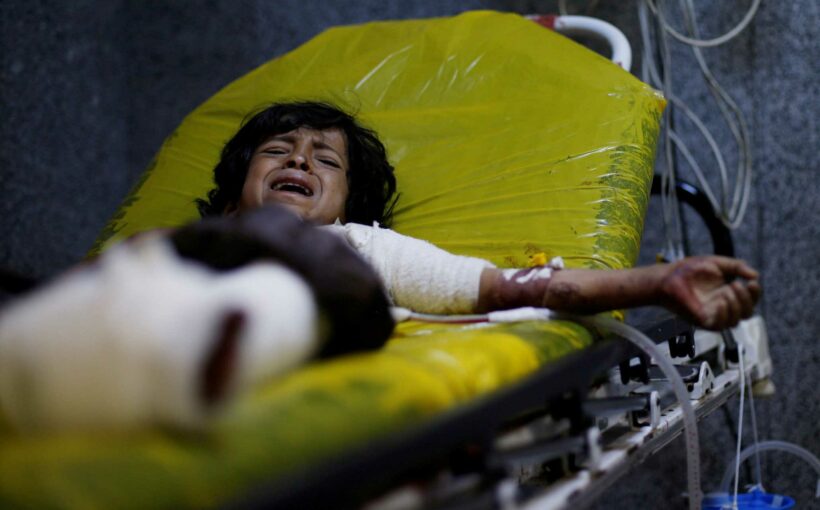Video credit: Skye Fitzgerald, director, Spin Film
Ahmed Elhubbish, a middle-aged Yemeni living in Yemen’s capital city of Sanaa, wants to know what his children — Abdul Rahman, Khalid, Wasim and Siham — did wrong.
Last year, they were killed in an airstrike launched from thousands of miles above them by sophisticated machinery from continents away. What could make them targets for the coalition led by Saudi Arabia and supported by the U.S. that has been bombing Yemen since 2015?
“There’s not a single reason” for persistent attacks on Yemenis such as the May 2019 strike that hit his children, Elhubbish said through a translator in an outtake from “Hunger Ward,” a new documentary on the war and mass starvation in Yemen, which was directed by Oscar and Emmy nominee Skye Fitzgerald. (Watch above. Note: The video contains graphic images.)
The footage, which was shot for the documentary and shared exclusively with HuffPost, showed the immediate aftermath of an airstrike and included reflections by Elhubbish and others that highlight the toll of the bombing campaign.
Lawmakers, U.S. officials, humanitarian groups, anti-war activists, arms dealers, foreign representatives and others have debated the American role in Yemen for years in Washington ― though rarely with such vivid evidence of the policy’s consequences as is documented in Fitzgerald’s film.
It’s vital now to have a clear picture of what President-elect Joe Biden’s choices could mean for Yemen as he assumes the presidency later this month and will have the power to change U.S. policy.
The country’s current crisis began in the fall of 2014, when Iran-backed rebels known as Houthis ejected Yemen’s internationally recognized government from Sanaa. Six months later, Saudi Arabia and its allies, notably the United Arab Emirates, launched a military intervention against the Houthis ― with crucial backing from the U.S. and other Western nations that continues despite persistent reports that the coalition is violating human rights standards and international law.
Most national security experts believe that without American support for the bombing, the Saudi-led coalition would need to seriously curtail its operations. That move would also make the kingdom more keen to cut a peace deal with the Houthis and address deadly tussles for influence among its own Yemeni partners.
The war has now killed nearly a quarter of a million people, the United Nations reported in December. Airstrikes by the Saudi-led coalition have killed at least 18,000 civilians, according to the Yemen Data Project, an independent monitoring group. The strikes have hit hospitals, markets, schools and other nonmilitary targets, prompting State Department lawyers to worry that American involvement could implicate U.S. officials in war crimes.
After nearly five years of fighting, the Houthis continue to control the most populated parts of Yemen ― and the Saudis continue to bomb those regions with U.S. support, most recently on New Year’s Eve.
Under President Barack Obama, Washington provided the Saudi-led coalition with aerial refueling that enabled it to run longer bombing campaigns, as well as intelligence and regular supplies of fresh bombs, while defending the campaign from international criticism and supporting a Saudi blockade of Yemeni ports that drove up food prices and pushed millions of Yemenis into famine-like conditions.
President Donald Trump continued that policy and took further steps against the Houthis that had devastating consequences for Yemenis, such as slashing U.S. aid for Houthi-controlled regions amid the coronavirus pandemic. When lawmakers and rights groups called for a tougher U.S. approach to the Saudis over their role in the murder of journalist Jamal Khashoggi, Trump cut off the aerial refueling assistance but left in place other forms of American aid to the Saudi-led coalition.
Trump also vetoed bipartisan legislation to cut off that support and to stop sending more bombs to the countries involved in the war.
Biden has promised he will end the Obama-era policy and treat Saudi Arabia as a “pariah.” But he will face a test of how seriously he takes that promise early in his presidency: Biden will have to decide whether to block a giant arms package that Trump crafted for the U.A.E. last fall, which the vast majority of congressional Democrats opposes.
“The humanitarian situation in Yemen is predicted to deteriorate even further in the coming months with hunger on the rise,” Scott Paul of Oxfam America told HuffPost in December after a slim Senate majority approved the U.A.E. weapons package, which includes munitions that could be used in Yemen. “Congress and the Biden administration should do all they can to halt these arms sales and be a force for peace to save lives in Yemen.”
RELATED…
Source: Read Full Article
